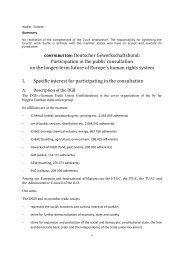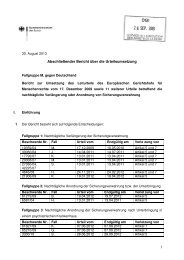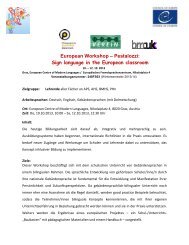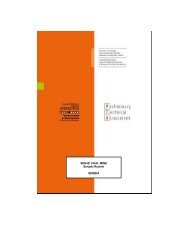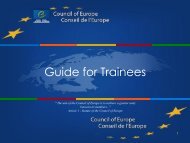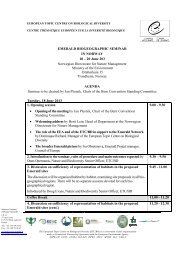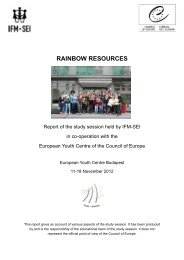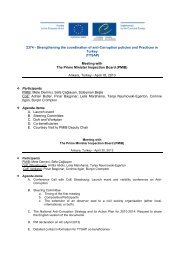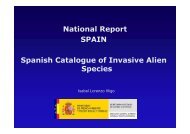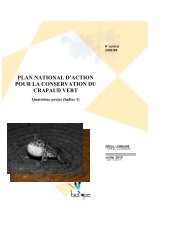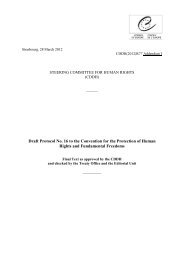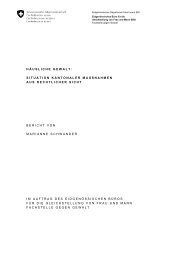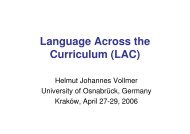Money laundering through money remittance ... - Council of Europe
Money laundering through money remittance ... - Council of Europe
Money laundering through money remittance ... - Council of Europe
You also want an ePaper? Increase the reach of your titles
YUMPU automatically turns print PDFs into web optimized ePapers that Google loves.
<strong>Money</strong> Laundering <strong>through</strong> <strong>Money</strong> Remittance and Currency Exchange Providers - 2010 <br />
identification and record keeping procedures, training on the detection false documentation could be<br />
especially useful.<br />
115. Licensing / registration systems – Countries should clearly designate the regulatory<br />
authorities delegated the authority to license and/or register MRs/CEs and to monitor MR/CEs. Due to<br />
the particular nature <strong>of</strong> the services they are providing, it is highly beneficial for the same institution to<br />
license or register and supervise them. The institution authorised to issue licenses or registering the<br />
MR and CE service providers should have access to public as well as restricted information. Often the<br />
information held in databases that have a restricted access (for example, police databases) is <strong>of</strong> great<br />
value. As indicated in the previous section, the advantages <strong>of</strong> one type <strong>of</strong> regulatory framework<br />
(licensing or registration) over another could not be determined by this study. This issue may be<br />
worth exploring further.<br />
116. Supervision – Given the high vulnerability <strong>of</strong> MR/CE activity to ML and TF, reinforcing<br />
supervision should be considered as essential to prevent and deter the misuse <strong>of</strong> such businesses.<br />
Training should enable the staff <strong>of</strong> relevant supervisory authorities to assess the quality <strong>of</strong> internal<br />
procedures <strong>of</strong> MR/CE service providers. It should also enable them to determine whether or not risk<br />
management policies and processes are appropriate in relation to the business‟s pr<strong>of</strong>ile and whether<br />
senior management has adequate risk management policies along with the necessary procedures and<br />
controls.<br />
117. Fit and proper – It is vital to have an appropriate „fit and proper‟ system in place to<br />
effectively identify the true beneficial owner <strong>of</strong> a company and to guarantee that MR and CE providers<br />
do not operate in an unlawful manner. The „fit and proper‟ control should be <strong>of</strong> a continuous nature to<br />
effectively rule out any cases where the company is controlled by criminals. Using a regular<br />
registration renewal obligation is one way that this might be implemented.<br />
118. Agents – There should be ongoing scrutiny and monitoring <strong>of</strong> agents and sub-agents <strong>of</strong><br />
MR/CE service providers. Whether this can be achieved by a regulatory requirement on principals to<br />
undertake more detailed background checks on their agents, or the inclusion <strong>of</strong> agents within<br />
the requirements should depend on the particular circumstances <strong>of</strong> the country.<br />
119. Reporting systems – The detection <strong>of</strong> ML/TF activity in the MR/CE sector can be improved<br />
only if reporting requirements, including the threshold-based reporting systems, are implemented<br />
effectively. Given the risk <strong>of</strong> receiving too many (or too few) STRs from the sector and in order to<br />
avoid over-reporting in threshold-based reporting system, automatic or semi-automatic control<br />
mechanisms could be integrated into the databases <strong>of</strong> the authority that collect such information.<br />
120. Information sharing – The legal framework should clearly define information-sharing<br />
responsibilities between the regulatory authorities, law enforcement agencies, and the private sector.<br />
Information exchange between the public and private sector is essential for an effective national ML<br />
strategy to function.<br />
121. At international level – Closer cross-border co-operation has sometimes found lacking in<br />
this area. MR/CE business activity by its nature <strong>of</strong>ten involves persons and activities (as well as<br />
currency) from different jurisdictions. MR/CE services are therefore frequently provided by<br />
multinational companies. Due to the cross-border aspect <strong>of</strong> <strong>money</strong> <strong>remittance</strong> there is sometimes<br />
confusion as to which authority in which country should intervene if suspicious activity is detected.<br />
Effective and prompt international co-operation between the law enforcement agencies has proven to<br />
be <strong>of</strong> paramount importance in guaranteeing that such attempts do not remain unpunished. FIU-to-<br />
FIU co-operation has proven to be particularly important in this respect, even beyond exchanges on<br />
specific STRs.<br />
© 2011 MONEYVAL and FATF/OECD - 43



